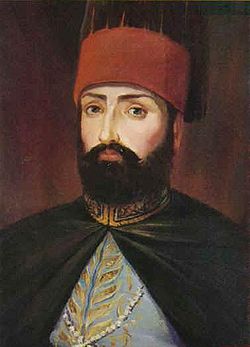1839 ⟶ Hatt-ı Şerif of Gülhane and the Tanzimât Reforms
The Hatt-ı Şerif of Gülhane (Supreme Edict of the Rose House...Year
1808
1826
1839
1856
1858
1876
👑 Mahmud II Ascends the Ottoman Throne
Bairakdar, the ayan of Rusçuk, having arrived in Constantinople too late to restore Selim III (who had been strangled), installed Mahmud II, the sole surviving member of the Ottoman line.⟶

Mahmud IIOttoman EmpireLeadershipGovernance19th CenturyPolitical HistoryReformJanissariesEuropean History
 Ottoman Empire
Ottoman Empire Turkey
Turkey🔪 Janissaries Massacre
Janissaries massacred by forces loyal to Mahmud II after they revolted following formation of new army corps.⟶
JanissariesMahmud IIOttoman EmpireMilitary reform19th CenturyGovernanceMilitaryReform
 Ottoman Empire
Ottoman Empire Turkey
Turkey📜 Hatt-ı Şerif of Gülhane and the Tanzimât Reforms
The Hatt-ı Şerif of Gülhane (Supreme Edict of the Rose House) issued by sultan Abdülmecid I, which began the Tanzimât reforms of the Ottoman Empire.⟶

Ottoman EmpireReformGovernance19th CenturyTanzimatModernization
 Turkey
Turkey📜 Hatt-ı Hümâyûnu (Reform Edict)
Hatt-ı Hümâyûnu (the Reform Edict of 1856) is issued on February 18 and constitutes the most important Ottoman reform measure of the nineteenth century. It guaranteed the lives and property of Christians, replaced the heads of churches with a national synod, provided full freedom of conscience and civil participation for adherents to all religions. The edict was forced on the sultan by the British, French and Austrians to forestall a Russian intervention.⟶

Ottoman Empire19th centuryReformTanzimatReligious FreedomCivil RightsEuropean InfluenceLaw
 Ottoman Empire
Ottoman Empire⚖️ Feudal Holdings Abolished in Ottoman Empire
Feudal holdings abolished in the Ottoman Empire.⟶
Ottoman Empire19th centuryLand ReformTanzimatLawFeudalism
 Ottoman Empire
Ottoman Empire👑 Constitutional monarchy in Ottoman Empire (first phase)
Constitutional monarchy in Ottoman Empire (Turkey)(first phase)⟶
Ottoman EmpireConstitutional MonarchyTanzimatReformGovernanceModernization19th Century
 Turkey
Turkey